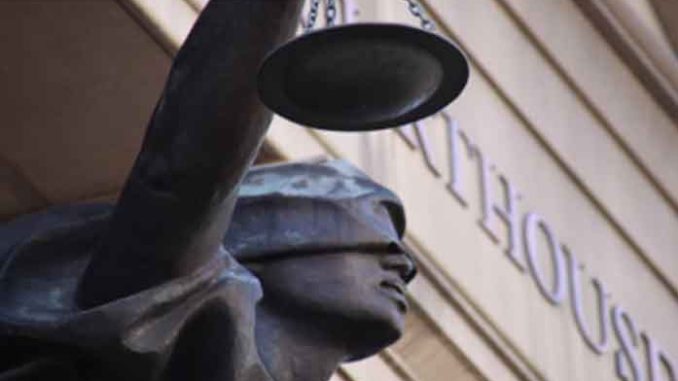
The legal effort by the chairwoman of the Arizona Republican Party to have a judge award the state’s 11 electoral votes to President Donald Trump based on her allegations of misconduct in Maricopa County’s election process was shot down in court Friday following an evidentiary trial.
Kelli Ward filed a legal challenge last month seeking a court order granting Arizona’s electoral votes to Trump, despite the fact Secretary of State Katie Hobbs and Gov. Doug Ducey certified Joe Biden as the winner with a 10,457 vote margin. The defendants in the case are the 11 Democrats slated to participate in the Electoral College on Dec. 14.
In a nine-page Order issued Friday afternoon, Judge Randall Warner of the Maricopa County Superior Court said he found “no misconduct, no fraud, and no effect on the outcome of the election.” He also ruled Ward failed to prove during the evidentiary trial that Biden did not rightly receive the highest number of votes in Arizona.
“The Plaintiff in an election contest has a high burden of proof and the actions of election officials are presumed to be free from fraud and misconduct,” Warner’s Order noted, adding “for the Court to nullify an election that State election officials have declared valid is an extraordinary act to be undertaken only in extraordinary circumstances.”
Warner added that a plaintiff alleging misconduct “must prove that the misconduct rose to the level of fraud, or that the result would have been different had proper procedures been used.” That was not done in this case, the judge noted.
One consequence of Ward’s loss is that Warner set a Jan. 5, 2021 deadline for the Democratic defendants to file a request for attorneys’ fees and court costs incurred in defending the challenge. In the meantime, the judge issued a partial final judgment so Ward can file an immediate appeal to the Arizona Supreme Court.
In her challenge, Ward alleged political party observers in Maricopa County were given “insufficient opportunity” to properly observe the general election. And that county election workers incorrectly verified a “significant number” of affidavit signatures on mail-in ballot envelopes, thus allowing illegal ballots to move to tabulation.
She also alleged multiple errors occurred in the duplication of ballots, resulting in the wrong presidential candidate’s oval being marked on several ballots. Many of those errors resulted in Trump being denied votes cast for him, Ward argued.
Earlier this week Warner dismissed Ward’s claim that election observers were unable to do their part in Maricopa County. “The observation procedures for the November general election were materially the same as for the August primary election, and any objection to them should have been brought at a time when any legal deficiencies could have been cured,” he noted.
Warner’s Order explains that Ward’s claim of improper signature verification on mail-in envelopes did not consider that comparing signatures is “just one part” of the safeguards put in place to ensure only legal ballots make it to tabulation. Other verification steps include matching addresses or phone numbers written on the envelopes, and even the handwriting of those identifiers.
The Maricopa County’s Recorder’s Office reviewed more than 1.9 million early voting ballot envelopes and flagged about 20,000 of the affidavit signatures for further review. Of those, roughly 600 could not be validated, meaning the ballots inside those envelopes were not sent on for tabulation.
“There is no evidence that the manner in which signatures were reviewed was designed to benefit one candidate or another, or that there was any misconduct, impropriety, or violation of Arizona law with respect to the review of mail-in ballots,” Warner noted.
Most of the testimony during the 12-hour trial centered on Ward’s third claim that Maricopa County election officials did not ensure proper duplication of some ballots.
Duplication is necessary when a new ballot must be prepared by a two-person bipartisan board because the original is damaged in some way that it cannot be read by a tabulation machine. Duplication is also utilized for voters who cast a ballot via email under the Uniformed And Overseas Citizens Absentee Voting Act; those UOCAVA “votes” must be marked to a ballot that can be sent for tabulation.
Warner ruled Maricopa County “faithfully” followed the legislatively-prescribed duplication procedures with its 27,869 duplicated ballots, despite “credible testimony” from observers and poll workers of problems with the duplication software.
“When mistakes were brought to the attention of election workers, they were fixed,” the judge noted, adding that despite some human errors, “the duplication process for the presidential election was 99.45% accurate.”
There was also no evidence, Warner ruled, that any duplication errors were intentional or part of a fraudulent scheme.
“They were mistakes,” he noted. “And given both the small number of duplicate ballots and the low error rate, the evidence does not show any impact on the outcome.”
That lack of impact was critical, Warner noted. “As a matter of law, mistakes in the duplication of ballots that do not affect the outcome of the election do not satisfy the burden of proof,” he ruled.
Warner’s Order also included a brief civics tutorial, noting the State Legislature “enacts the statutes that set the rules for conducting elections” while the Executive Branch -which includes Secretary of State Katie Hobbs and election officials in Arizona’s 15 counties- determines how to implement the legislation.
“These decisions are made by balancing policy considerations, including the need to protect against fraud and illegal voting, the need to preserve citizens’ legitimate right to vote, public resource considerations, and—in 2020—the need to protect election workers’ health,” he ruled. “It is not the Court’s role to second-guess these decisions.”
